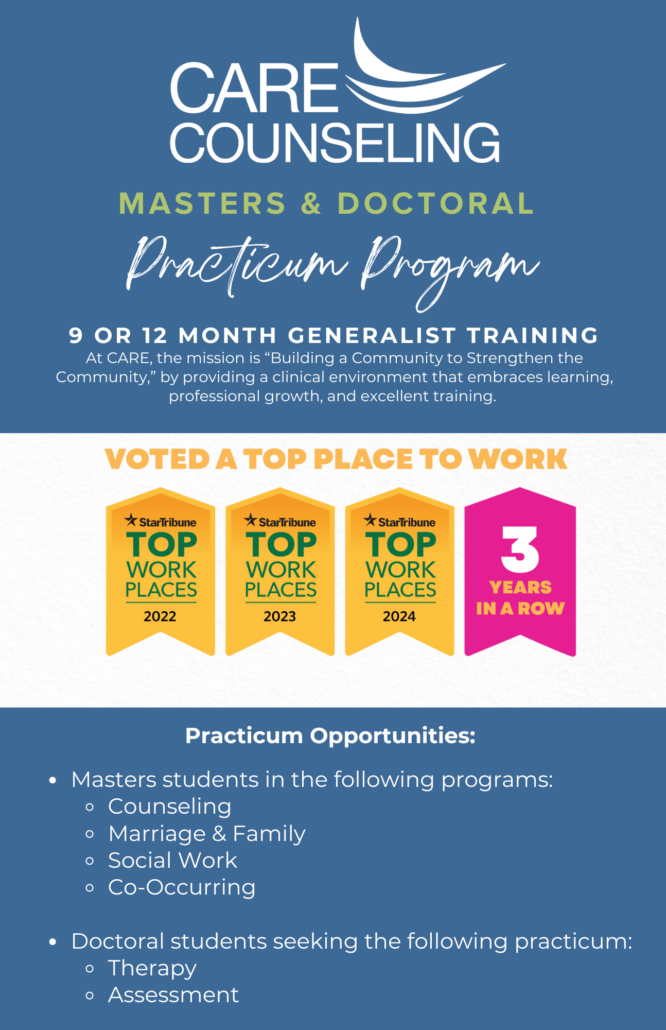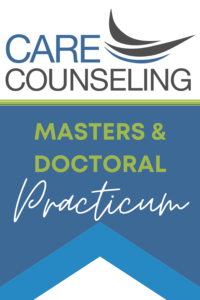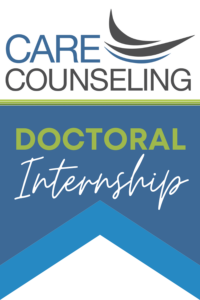Masters & Doctoral Practicum Student Journey
CARE is honored to join this part of a student’s initial professional path and we realize how important a supportive community can be at this stage in one’s growth and education. That is why CARE focuses on building a strong cohort of students across multiple disciplines to promote quality and diverse learning experiences throughout one’s practicum. The student community at CARE is actively involved within the cohort, weekly supervision, and other training opportunities below!
Student experience at CARE Counseling:
The CARE practicum program: We are focused on cultivating an immersive training experience in an outpatient mental health setting. The practicum begins with an extensive on-boarding experience to support your initial training needs, and ongoing supportive resources are provided throughout the practicum. The practicum experience is for a nine (9) or 12 month commitment, with the potential to have an advanced practicum placement and/or to stay on after graduation and transition to a PILT.
Doctoral Level Training: For doctoral students interested to gain assessment experience, see section below on “Psychological Testing” for more details on how CARE can support your training goals. For those seeking a doctoral internship, find out more about the CARE Counseling Internship Program here
Practicum Hours: Students work 20 hours per week Monday through Friday onsite, hybrid, or remote. Days and hours are determined prior to students starting and will be based on the student and clinic’s needs. These can also shift each semester to accommodate schedules or other life demands.
Clinical Practice: We believe one of the best ways to learn how to be an effective therapist is by learning through experience. Students will see a caseload of 8-10 clients each week for Master’s Level and 10-12 for Doctoral Level trainees. This will also help those trainees who have direct client and relational requirements for their programs and help prepare for when the student enters the field as a Mental Health Practitioner after graduation.
Weekly Individual Supervision: At CARE we prioritize supervision and learning, therefore, CARE provides consistent individual supervision every week. If your supervisor is out for the week, supervision coverage will be provided. Additionally, students will present two recorded sessions each semester to their individual supervisor for continued reflection, learning and growth.
Weekly Case Consultation: The student community at CARE meets for one hour a week for clinical consultation which is led by an experienced CARE Clinician. With both consult and supervision there may be reflective tasks outside of these hours, which are built into a student’s overall weekly schedule expectations.
Three assignments throughout the practicum year:
- Teach a skill or technique to the group. This will help build your therapy toolbox to utilize in your clinical practice.
- Present a case with a research component. This aids in being consumers of professional literature and instilling life-long learning to promote growth and development while applying it to a specific case.
- Present on something you find interesting or important to our field. This demonstrates the importance of integrating relevant topics and research to clinical practice. We are all lifelong learners.
Specific learning opportunities include:
Psychotherapy Grounded in Theory: Conducting individual therapy across the age span, family therapy, and/or couples counseling. Students will be well trained in both providing telehealth and in-person services to build competency with both.
Efficient and Accurate Clinical Writing Skills: Writing diagnostic assessments (along with learning how to accurately diagnose), jointly developing and executing treatment plans grounded in theory, and documenting progress in daily notes and treatment summaries.
Clinical Supervision: Supervision/training is a top priority for us, so you will get a lot of support and feedback to help foster your growth and development. Attending weekly supervision and gaining the dedicated support of the CARE supervision team in achieving the necessary requirements for your respective practicum.
Professional Development: Developing skills related to professional development, such as effective communication strategies, awareness of individual and cultural diversity, getting the most you can out of supervision and consultation, ethically minded practice, and so forth.
Coordination of Care: Becoming skillful at care coordination, including contact with schools, county workers, psychiatrists, and other systems involved with the client/family.
Cohort Model: Being part of our multidisciplinary student cohort, which provides invaluable support and opportunities for growth and learning; with the cohort model at CARE, practicum students move through the training experience together and support each other along the way.
- Fall cohort start: Tuesday after Labor Day
- Winter cohort start: Monday after New Years Day
- Summer cohort start: Tuesday after Memorial Day
Psychological Testing for Doctoral Students: Administering ADHD assessment battery, which will add to your total number of assessment batteries for your predoctoral internship application. There are three opportunities available for doctoral level students wanting to gain testing experience:
- Summer only assessment practicum (three-month 1-2+ battery weekly)
- Hybrid therapy and assessment (nine or twelve-month, 1+ battery monthly)
- Assessment only (nine or twelve-month, 1-2+ battery weekly)
Additional benefits when you’re on CARE’s team as a student:
Comprehensive Training: Education, training, inclusion, and supervision are a top priority at CARE. All of these are qualities that are central to the development of competent and ethical mental health providers. So, as a clinical trainee you will get a lot of support and feedback throughout your practicum!
Grand Rounds: Students are encouraged to attend monthly CARE hosted trainings to gain more in-depth learning on assorted topics, such as co-occurring concerns, ethical decision-making, practitioner resilience, providing culturally responsive care, etc.
Being a Part of Our Community: Students also get to engage with an incredible community that is passionate about what they do, enjoys working as a team, and wants to support your growth.
Open door environment: Have a difficult session? Want to connect about a case? Care to see if anyone is up for a social event? Support one another by helping up build a community to support the community. We encourage our team to connect with one another in informal ways, as well.
Beautiful offices and clinics around the cities and in Mankato.
Work culture: Being with an amazing community of clinicians passionate about what they do!
Career Opportunities: We often hire our students who do well during the practicum and are engaged in our greater CARE community. To extend your growth and learning at CARE, there may be an opportunity to pursue an advanced practicum position throughout and after your practicum experience.




